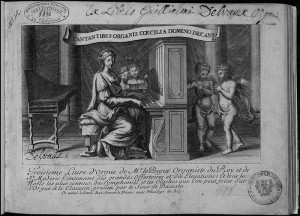Monsieur Noel – Nicolas LeBegue, “famous organist of Paris”
Among the many fine musicians with whom Charpentier was in contact in Paris was the celebrated organist and harpsichordist Nicolas LeBegue. Twelve years Charpentier’s senior, LeBegue was born in humble circumstances in the provincial town of Laon, where he most likely received his primary education in music from his uncle (and namesake.) He is first mentioned in 1661 in a payment document that describes him as “fameux organiste de Paris” implying that he had already established some reknown in his adopted city by that time.
In 1664, LeBegue was engaged as organist at the church of St. Merri, a position he retained for the remainder of his life. His first publication, the Pièces d’orgue, appeared in 1676 and in 1678 he was named organist to the King, a position he shared with three other notable musicians – Guillaume-Gabriel Nivers, Jacques-Denis Thomelin, and Jean-Baptiste Buterne – with each taking on duties for a quarter of the year (LeBegue was the “Autumn” organist.)
In the Mecure gallant in 1682, Jean Donneau de Visé describes several days of festivities at court (during which it rained incessantly apparently) that featured the Dauphin’s Music under the direction of Charpentier as well as Lebegue’s performance of a grand “Symphony Mass.”
Lebegue published five collections of keyboard music, three for organ and two for harpsichord. His Troisième livre d’orgue (1685) includes settings of nine noels, two of which will be played on Magnificat’s upcoming concerts by Jillon Stoppels Dupree. While organists of course performed and improvised upon the noel tunes for generations, Lebegue was the first to publish such arrangements and many composers followed suit with similar collections.
Innovative and prolific as a composer, LeBegue was also influential as a teacher, his students including François d’Agincourt, Gabriel Garnier, Jean-Nicolas Geoffroy, Gilles Jullien and, most notably, the sublime Nicolas de Grigny. He was also an expert on organ-building and frequently travelled throughout France advising on building and repairs.
While he is best known as a composer and performer of keyboard music, he also published vocal music including a collection of motets for solo voice and continuo. The first edition of these motets in 1687 atrributed them to “Mr. Noel,” perhaps an indication of the composer’s modesty (though the preface coincidentally includes considerable praise for the artistry of the excellent organist Nicolas LeBegue!) Appearing shortly after the publication containing his settings of noel, it is possible that the choice of pseudonym reflects their popularity. When the volume was re-printed after the composer’s death, all mystery was removed with its ascription to LeBegue.
